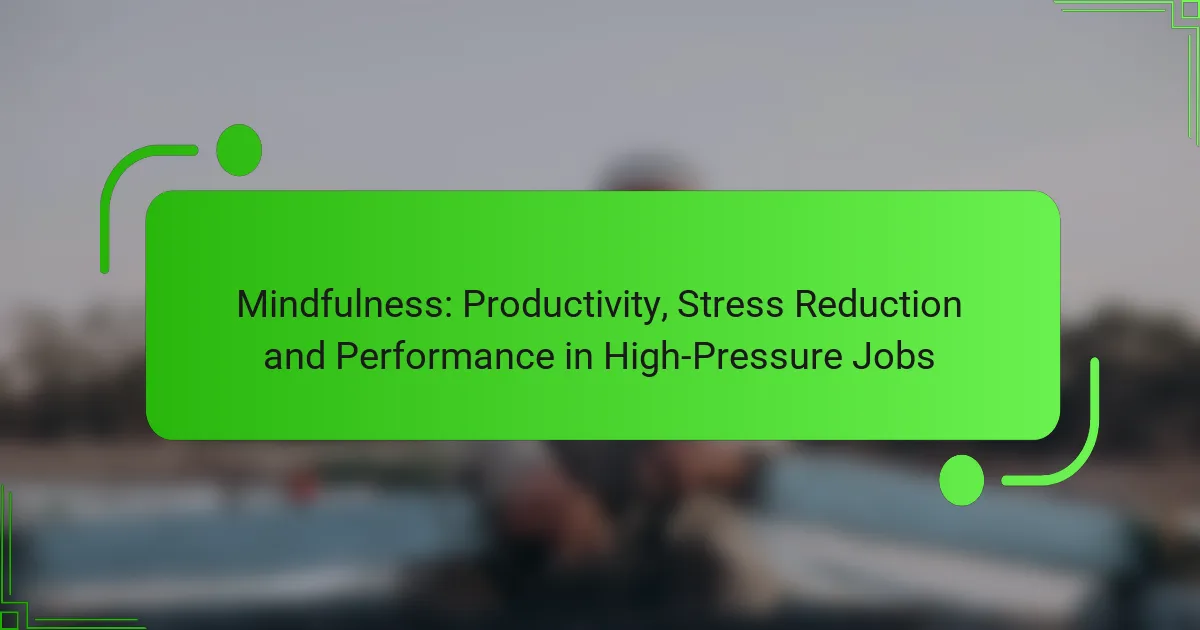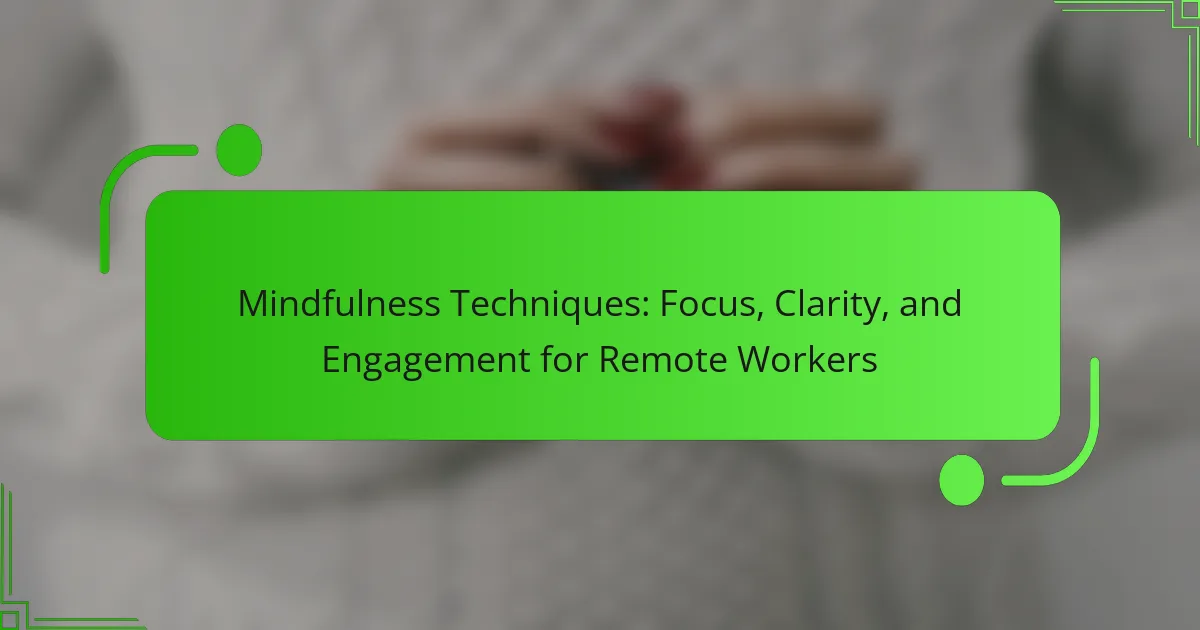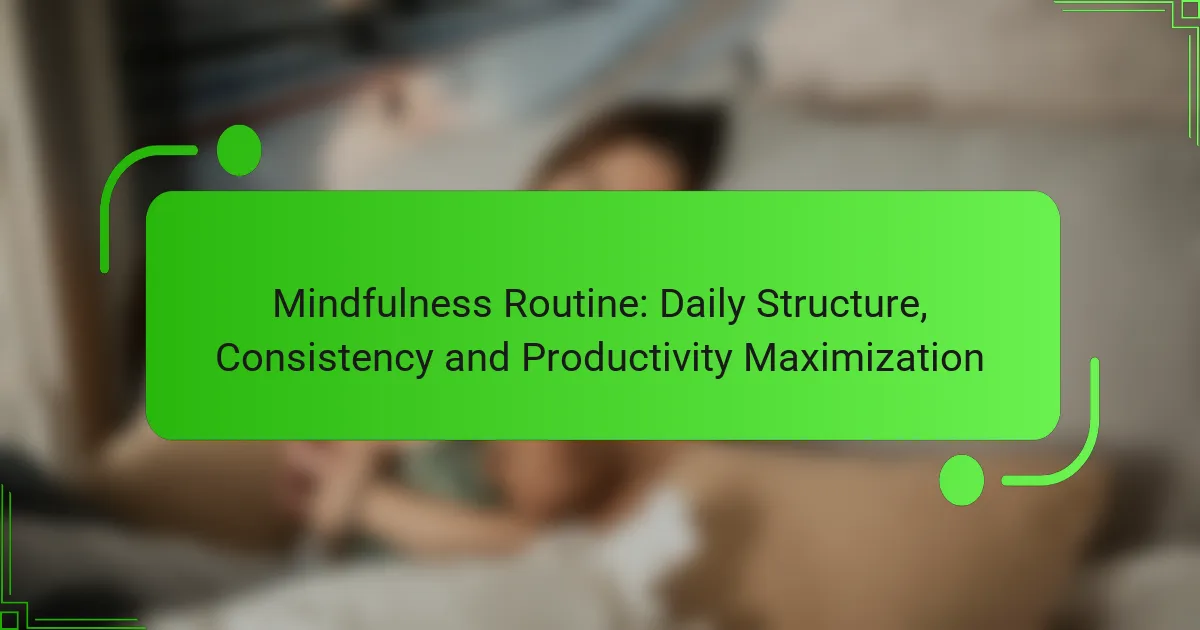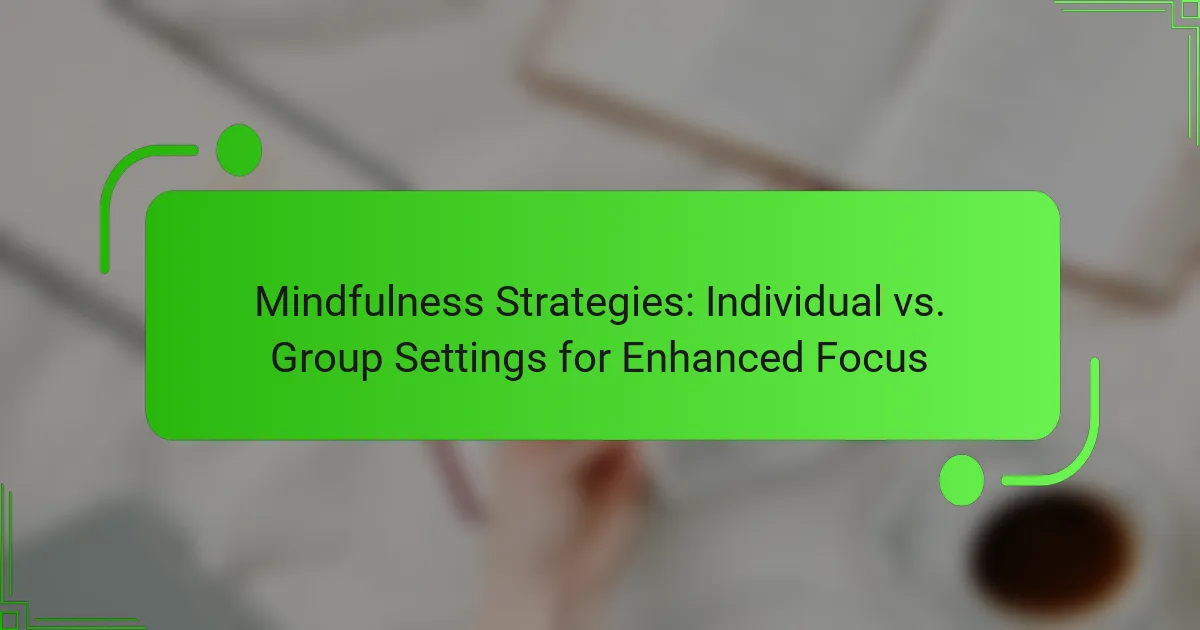Mindfulness is a powerful tool for enhancing productivity and performance in high-pressure jobs. By cultivating awareness and focus, individuals can effectively reduce stress and improve their ability to concentrate on tasks. Implementing mindfulness techniques not only fosters a sense of calm but also promotes better decision-making, ultimately leading to improved overall well-being and job performance.
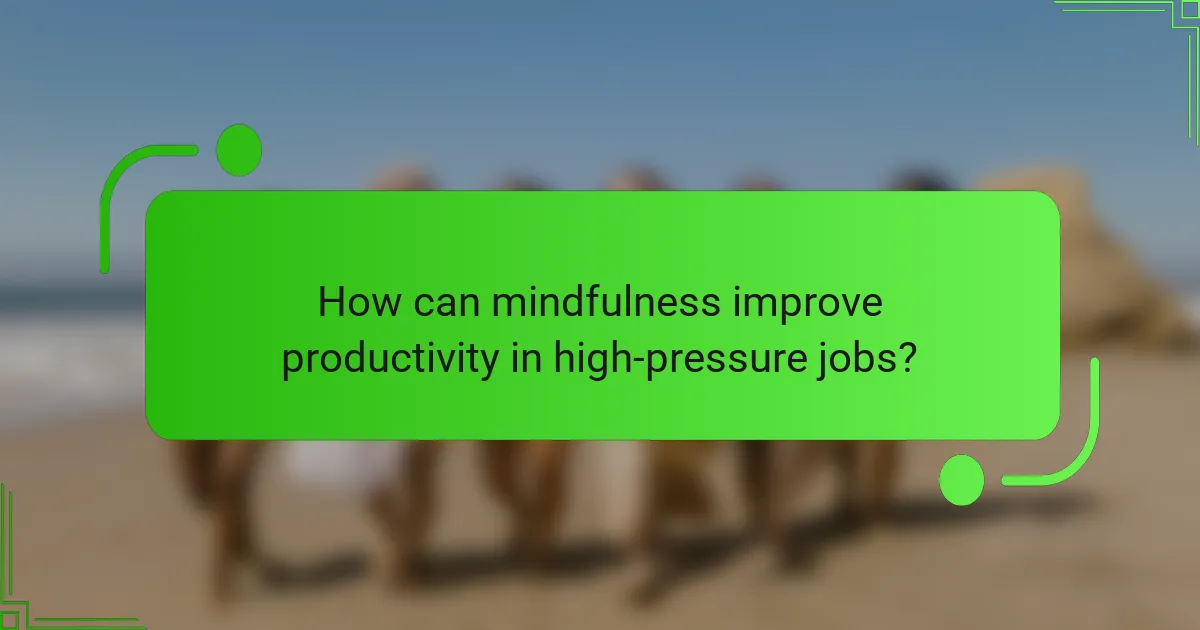
How can mindfulness improve productivity in high-pressure jobs?
Mindfulness can significantly enhance productivity in high-pressure jobs by fostering greater awareness and focus. By practicing mindfulness techniques, individuals can reduce stress and improve their ability to concentrate on tasks, leading to better overall performance.
Enhanced focus and concentration
Mindfulness practices, such as meditation and deep breathing, help individuals sharpen their focus and concentration. These techniques train the mind to stay present, minimizing distractions from external stimuli or internal thoughts. As a result, employees can devote their full attention to the task at hand, improving the quality of their work.
For example, taking just a few minutes to engage in mindful breathing before starting a project can clear mental clutter and enhance cognitive clarity. This practice can lead to a noticeable increase in the ability to concentrate for longer periods, especially in fast-paced environments.
Increased efficiency in task management
Mindfulness encourages a more organized approach to task management, allowing individuals to prioritize effectively. By being present and aware, employees can assess which tasks require immediate attention and which can be scheduled for later. This clarity helps in managing workloads more efficiently.
Utilizing techniques like the Pomodoro Technique, where work is broken into intervals followed by short breaks, can enhance efficiency. Mindfulness during these breaks can recharge mental energy, making subsequent work periods more productive.
Better time management skills
Practicing mindfulness can lead to improved time management skills by fostering a better understanding of how time is spent. Mindful individuals are more likely to recognize time-wasting habits and adjust their schedules accordingly. This awareness can lead to more intentional planning and execution of tasks.
For instance, keeping a mindful journal to track daily activities can reveal patterns that waste time. By identifying these patterns, employees can make informed adjustments to their routines, ultimately leading to more effective use of their time.
Improved decision-making abilities
Mindfulness enhances decision-making by promoting a calm and clear mindset. When individuals practice mindfulness, they can approach decisions with less emotional reactivity, allowing for more rational and thoughtful choices. This is particularly beneficial in high-pressure situations where quick decisions are often required.
Incorporating mindfulness into decision-making processes can involve pausing to reflect before responding to challenges. This pause can lead to more strategic thinking and better outcomes, reducing the likelihood of hasty, regrettable decisions.
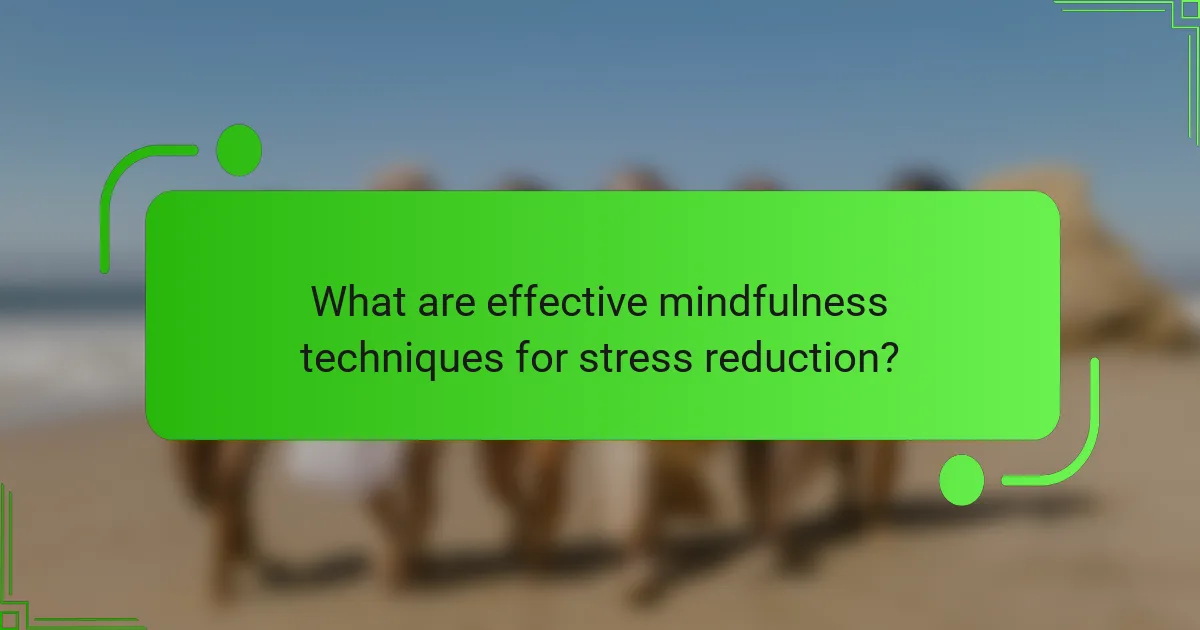
What are effective mindfulness techniques for stress reduction?
Effective mindfulness techniques for stress reduction focus on enhancing awareness and promoting relaxation. These practices help individuals manage stress by fostering a sense of calm and presence, which is crucial in high-pressure jobs.
Mindful breathing exercises
Mindful breathing exercises involve focusing on your breath to anchor your attention and reduce anxiety. A simple technique is the 4-7-8 method: inhale for 4 seconds, hold for 7 seconds, and exhale for 8 seconds. Practicing this for a few minutes can help lower stress levels significantly.
To enhance effectiveness, find a quiet space and sit comfortably. Aim to practice mindful breathing several times a day, especially during stressful moments. Avoid distractions and try to maintain a steady rhythm in your breathing.
Body scan meditation
Body scan meditation encourages awareness of physical sensations throughout the body, promoting relaxation and stress relief. This technique typically involves lying down and mentally scanning from head to toe, noticing areas of tension and consciously relaxing them.
To practice, set aside 10-20 minutes in a quiet environment. Close your eyes and focus on each body part, starting from your toes and moving upward. Acknowledge any discomfort without judgment, and breathe into those areas to facilitate relaxation.
Guided imagery practices
Guided imagery practices use visualization to create calming mental images, helping to reduce stress and enhance focus. This technique often involves imagining a peaceful scene, such as a beach or forest, while engaging all your senses to make the experience vivid.
To begin, find a comfortable position and close your eyes. Spend 5-15 minutes visualizing your chosen scene, incorporating sounds, smells, and textures. Consider using audio recordings or apps that provide guided sessions to enhance your experience and keep you on track.
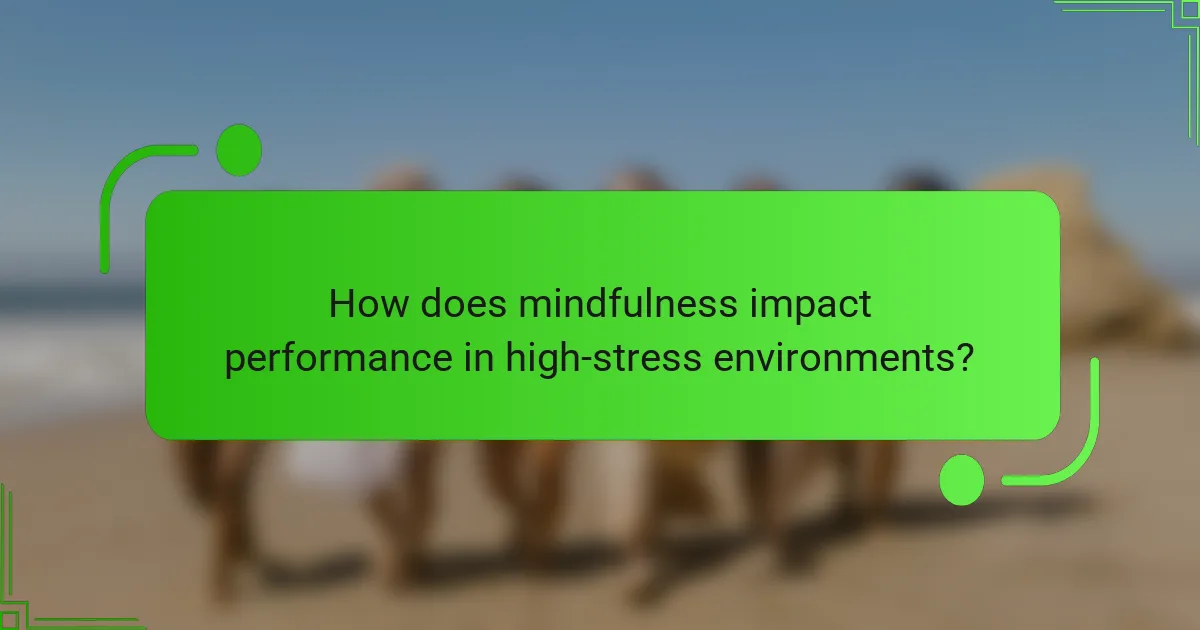
How does mindfulness impact performance in high-stress environments?
Mindfulness significantly enhances performance in high-pressure jobs by promoting focus, reducing stress, and improving overall well-being. Practicing mindfulness techniques helps individuals manage their reactions to stressors, leading to better decision-making and productivity.
Reduction of burnout rates
Mindfulness practices can lead to a notable reduction in burnout rates among employees in high-stress environments. By fostering a greater awareness of one’s thoughts and feelings, individuals can identify stressors early and implement coping strategies. Regular mindfulness sessions, even as short as 10-15 minutes a day, can help maintain energy levels and prevent emotional exhaustion.
Organizations that encourage mindfulness training often see a decrease in turnover rates and absenteeism, as employees feel more engaged and less overwhelmed. This proactive approach can save companies significant costs associated with hiring and training new staff.
Enhanced emotional resilience
Practicing mindfulness enhances emotional resilience, allowing individuals to bounce back more effectively from setbacks. By cultivating a non-judgmental awareness of their emotional states, employees can better regulate their responses to stress and adversity. This resilience is crucial in high-pressure jobs where challenges are frequent and intense.
Mindfulness techniques, such as deep breathing or guided meditation, can be integrated into daily routines, helping individuals develop a stronger mental framework to handle stress. Over time, this leads to improved coping mechanisms and a more positive outlook in challenging situations.
Improved interpersonal relationships
Mindfulness contributes to improved interpersonal relationships by fostering better communication and empathy among colleagues. When individuals practice mindfulness, they become more attuned to their own emotions and those of others, leading to more constructive interactions. This is particularly important in high-stress environments where teamwork is essential for success.
Encouraging mindfulness in the workplace can create a culture of support and understanding, reducing conflicts and enhancing collaboration. Simple practices, such as active listening and mindful feedback, can significantly improve team dynamics and overall job satisfaction.
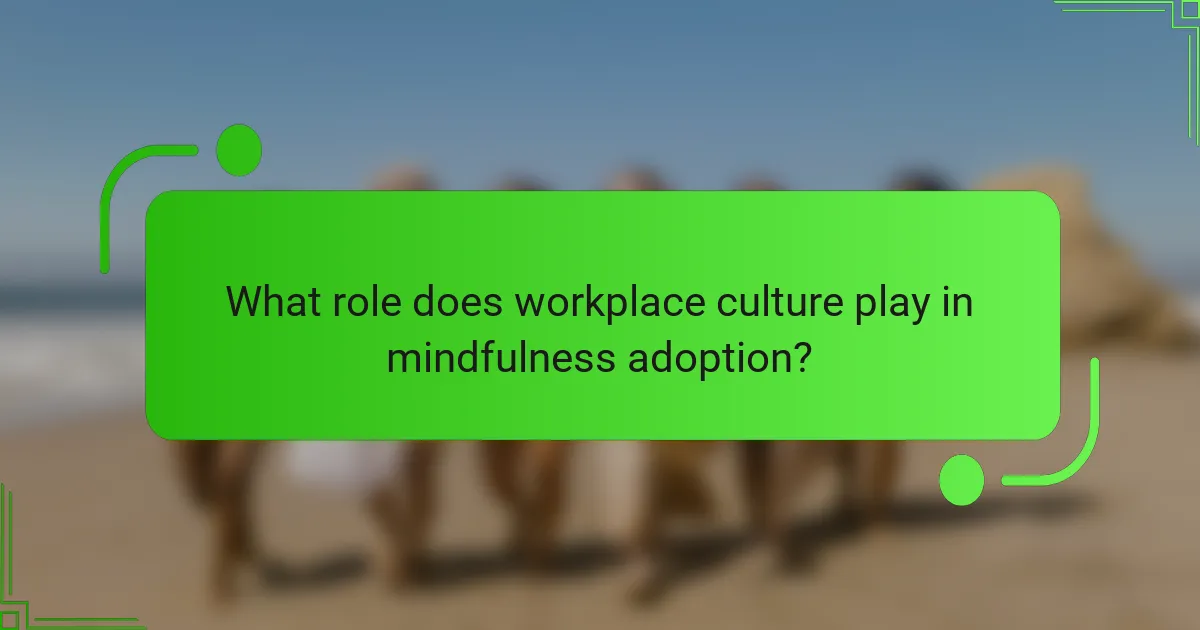
What role does workplace culture play in mindfulness adoption?
Workplace culture significantly influences the adoption of mindfulness practices, as it shapes employee attitudes and behaviors towards stress management and productivity. A culture that prioritizes mental well-being encourages individuals to engage in mindfulness, leading to improved performance and reduced stress levels.
Supportive leadership practices
Supportive leadership is crucial for fostering a culture that embraces mindfulness. Leaders who model mindfulness behaviors, such as taking breaks for reflection or promoting open discussions about mental health, create an environment where employees feel safe to practice mindfulness themselves. This can lead to increased employee engagement and lower turnover rates.
To implement supportive practices, leaders should consider regular training on mindfulness techniques and encourage team members to share their experiences. Simple actions, like scheduling mindfulness sessions during work hours, can reinforce the importance of mental well-being in the workplace.
Integration of mindfulness programs
Integrating mindfulness programs into the workplace can enhance employee well-being and productivity. Organizations can offer workshops, meditation sessions, or online resources that equip employees with mindfulness skills. These programs should be easily accessible and tailored to fit the specific needs of the workforce.
When implementing mindfulness programs, it’s beneficial to gather employee feedback to ensure the offerings are relevant and engaging. Additionally, providing incentives for participation, such as wellness points or recognition, can motivate employees to embrace these practices and contribute to a more mindful workplace culture.
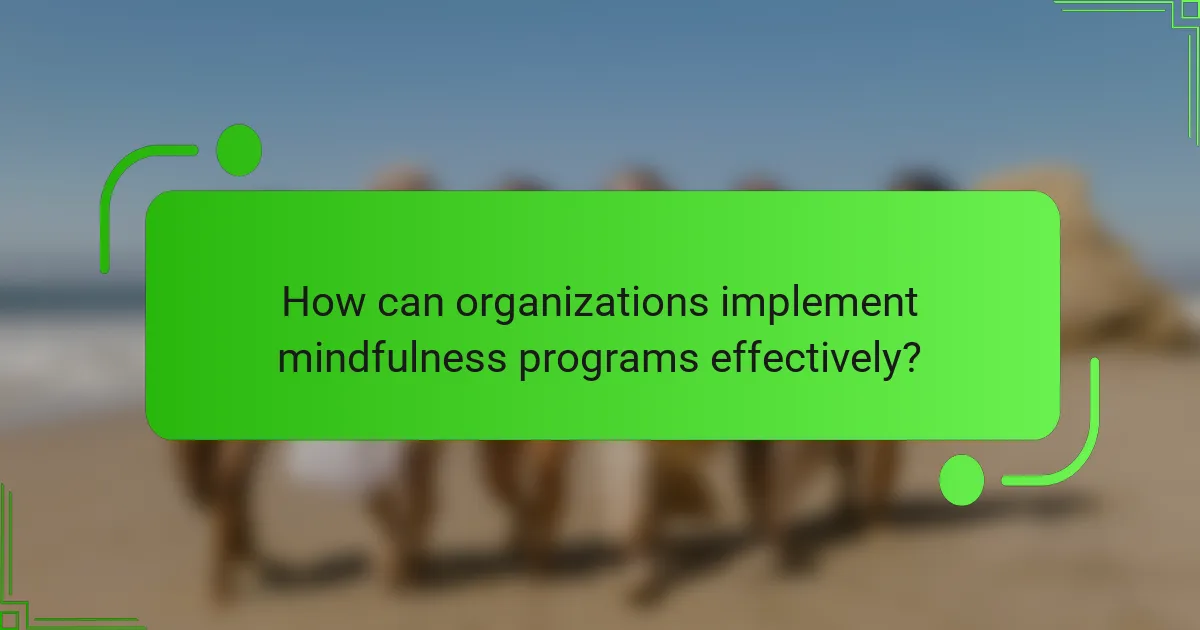
How can organizations implement mindfulness programs effectively?
Organizations can implement mindfulness programs effectively by integrating structured training and ongoing workshops that foster a culture of mindfulness. This approach not only enhances employee well-being but also boosts productivity and performance in high-pressure environments.
Training sessions for employees
Training sessions should be designed to introduce employees to mindfulness concepts and practices. These sessions can range from short, focused workshops to longer courses that delve deeper into techniques such as meditation, breathing exercises, and stress management strategies.
Consider scheduling these training sessions during work hours to encourage participation without adding to employees’ stress. A practical approach is to conduct sessions monthly, allowing employees to gradually build their mindfulness skills over time.
Regular mindfulness workshops
Regular mindfulness workshops can reinforce the skills learned in initial training sessions and provide ongoing support. These workshops can be held weekly or bi-weekly and should include a mix of guided practices, discussions, and opportunities for employees to share their experiences.
To maximize engagement, organizations can invite guest speakers or mindfulness experts to lead some workshops. Additionally, incorporating feedback from participants can help tailor future sessions to better meet the needs of employees, ensuring the program remains relevant and effective.
